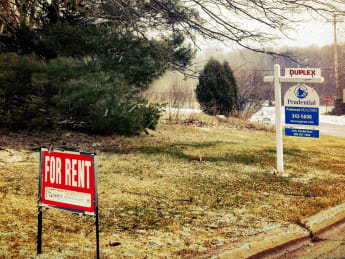 danielmoyle/Flickr
danielmoyle/Flickr
New mortgage underwriting criteria went into effect Jan. 10 requiring a debt-to-income ratio of less than 43 percent for most qualified mortgages. Even if you don't qualify for a mortgage under the current lending regulations, renting may not be your only option. Alternatives such as rent-to-own and contract-for-deed transactions make homeownership possible for those who may not meet mortgage-underwriting standards.
These transactions have some variations depending on state rules and the contents of the legal agreement, but a rent-to-own (or lease-purchase) transaction often means the buyer rents from the owner for a set period of time, after which the buyer agrees to purchase the property. In some cases, the tenant might pay extra money each month toward equity in the home. A lease-option agreement gives the lessee the option (and not the obligation as with lease-purchase) to later buy the property.
"It could be a house in a neighborhood that you really want to settle in but for whatever reason you can't qualify to buy a home," says Barry Zigas, director of housing policy at the Consumer Federation of America. "Instead, you can qualify to rent one that you'd like to be able to buy in the future." Zigas says rent-to-own especially appeals to former homeowners who want to get back into ownership.
In contract-for-deed agreements (also called bond for deed or installment land contracts), the purchase is often financed by the seller rather than a third-party mortgage company. One benefit to the seller is that the process is typically faster than a traditional mortgage, according to Richard Ernsberger, attorney at the Pittsburgh-based law firm Behrend & Ernsberger. In real estate markets that are still recovering from the recession, it could also give sellers an alternative to staying put or leaving the property on the market indefinitely.
For the buyer, perhaps one who doesn't currently qualify for a mortgage, it could buy time to improve his or her credit score. "It gives you the chance to live in a place before completing the sale," Ernsberger says. "You can structure the agreement so that the person you're purchasing the house from will report [your payments] to the credit bureaus. Maybe after two to three years, you could qualify for a traditional mortgage."
Mark Colwell, a Redfin real estate agent and real estate investor in San Francisco, has entered into several lease-option transactions and says the arrangement gave him more time to consider his financing options. "Usually you shop for financing for a week," he says. "This allowed me to shop for financing for well over a year. If you're an investor, it gives you time to look for partners or line up remodel strategies for particular properties."
Consumers can also use rent-to-own transactions for their primary residence; for instance, those who need to wait a little longer to demonstrate steady W-2 income on their tax return. "If you're six months away from getting financing, this a way to tie up a property in today's market and pay for it later at today's price," Colwell says.
Sound too good to be true? There are potential downsides, too. First, these transactions often have a higher overall cost than a traditional mortgage, so they're sometimes associated with predatory lending practices. Also, the price of the property might be agreed upon at the time of the agreement, but mortgage rates can still increase by the time the buyer becomes eligible and exercises the lease purchase or lease option.
These transactions can also get complicated, especially if one party wants out. "Depending upon the state, [a tenant who moves out] may still have an interest in the property that can impair title to the property," Ernsberger says. "The landlord would then need to file a Quiet Title action to clear up the title problems."
Purchasers can also run into title issues. "From the tenant's perspective, the rent-to-own contract must prohibit the landlord from taking out a mortgage against the house during the tenancy," Ernsberger says. "The purchaser should also hire someone to do a title search to ensure the landlord actually owns the property."
Always have a knowledgeable attorney review a rent-to-own or contract-for-deed agreement before you sign anything. "Rent-to-own can be an advantageous transaction, but it depends how it's structured -- like whether the renter is building equity through the rental payments," Zigas says.
Before purchasing through rent-to-own or contract-for-deed, buyers should also explore mortgage eligibility. "By and large, consumers will get the best terms, best rates and best protection by obtaining a home loan by a regulated bank institution," Zigas says. "You should shop around for home financing just like you'd shop around for a car loan. But at the moment, it is a marketplace that has a very narrow credit box, which means it can be hard to quality for a mortgage."

Comments(0)